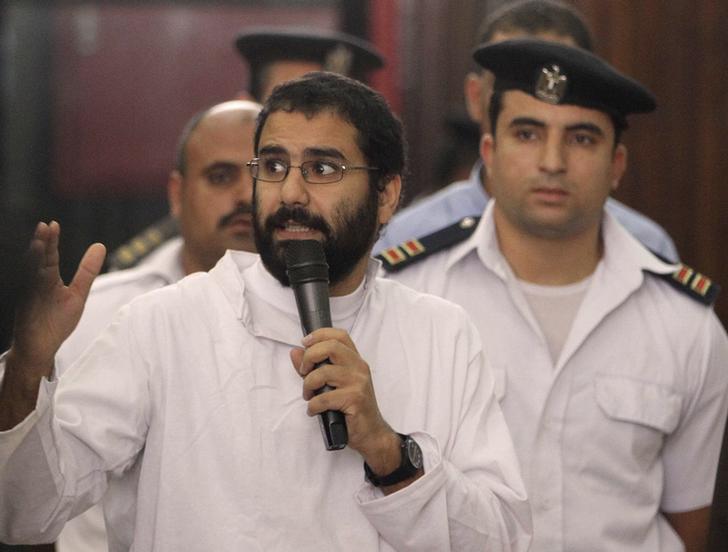Latest NEWS
- Aswat Masriya, the last word
- Roundup of Egypt's press headlines on March 15, 2017
- Roundup of Egypt's press headlines on March 14, 2017
- Former Egyptian President Hosni Mubarak to be released: lawyer
- Roundup of Egypt's press headlines on March 13, 2017
- Egypt's capital set to grow by half a million in 2017
- Egypt's wheat reserves to double with start of harvest -supply min
- Roundup of Egypt's press headlines on March 12, 2017
Alaa Abdel Fattah's defence accuses prosecution of fraud

Activist Alaa Abdel Fattah speaks in front of a judge at a court during his trial in Cairo, November 11, 2014. REUTERS/Al Youm Al Saabi Newspaper
CAIRO, Jan 17 (Aswat Masriya) – The defence team for political activist Alaa Abdel Fattah and other defendants charged with violating the protest law has accused on Saturday the prosecution of fraud and submitting new evidence to the court long after it was due.
Abdel Fattah, a political activist who gained attention during the January 25 uprising in 2011, and 24 other defendants were sentenced to 15 years in prison last June for illegal assembly, among other charges. The court then ordered a retrial in June.
Khaled Ali, a renowned human rights lawyer and a member of the defence team for the case, claimed "that the defence was meant to continue its arguments today… but the prosecution submitted evidence completely irrelevant to the case." He added that all evidence in the case was already reviewed last March.
Ali asked the court to submit the evidence to forensics in order to determine if fraud was committed.
The court said it would not allow the defence to accuse the prosecution of fraud. It also added that the prosecution's standing is that of the court and its rights will not be violated.
The court postponed the trial until February 5, when it is due to review the arguments.
Abdel Fattah was arrested from his home in November 2013 for illegal assembly, blocking roads, attacking a police officer and stealing his radio. The other defendants were arrested after the authorities dispersed a demonstration denouncing a constitutional article which permits military trials for civilians outside the Shura Council on November 26, 2013.
Though released in March 2014, Abdel Fattah was sent back to jail on June 11 after the court sentenced him and the other defendants to 15 years in absentia for the same charge.
The 25 defendants were initially charged with protesting without permit, attacking and resisting the authorities among other crimes.
Former interim President Adli Mansour issued the protest law on November 24, 2013 to regulate peaceful assembly. The law has long been the epicentre of wide criticism by domestic and international human rights organisations which say it violates international standards for peaceful protests.
The legislation obliges demonstrators to inform the authorities of their intention to assemble three days prior to their scheduled events. It also gives the interior ministry the right to cancel, postpone or move protests.
The Egyptian Centre for Economic and Social Rights (ECESR) filed in September 2014 a lawsuit at the Supreme Constitutional Court, Egypt's top court, challenging the constitutionality of articles in the law.










